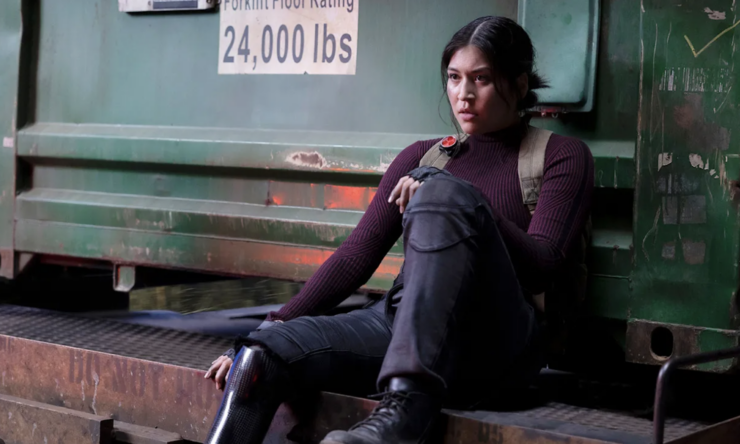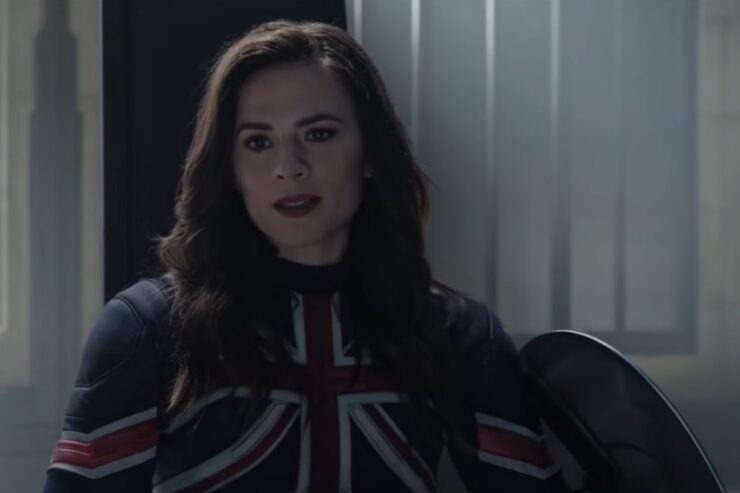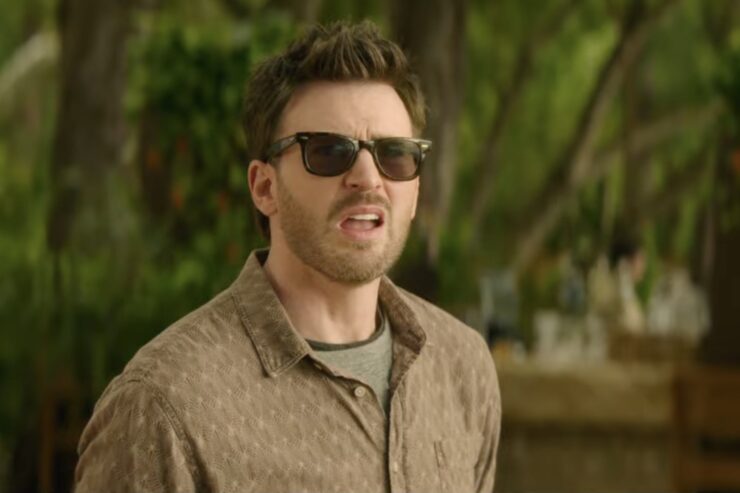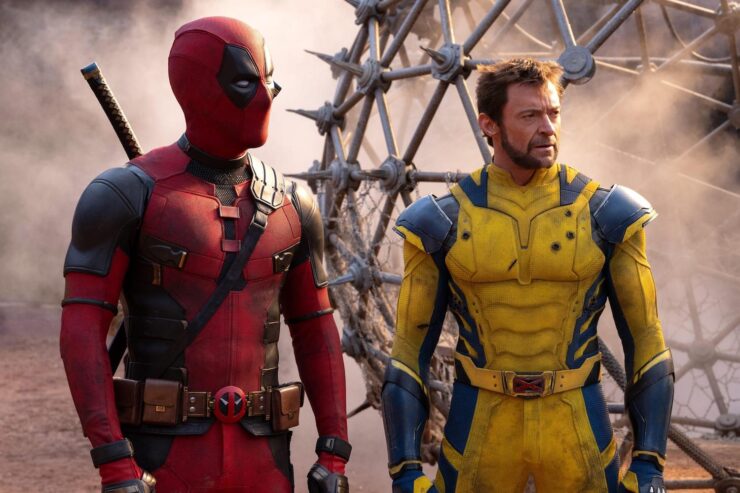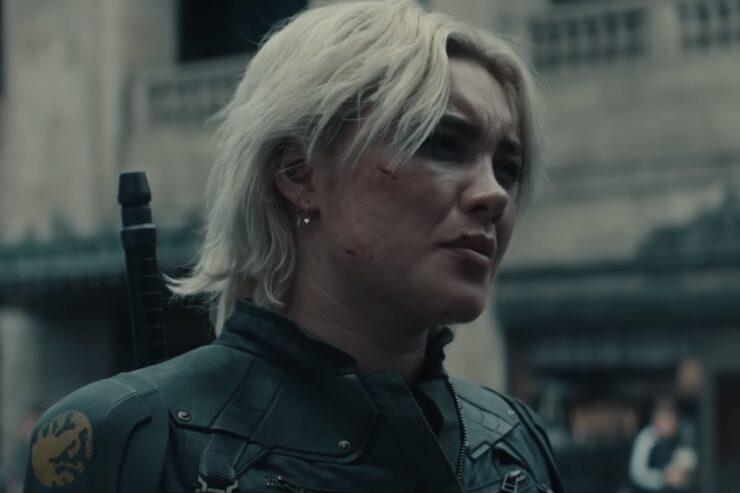Echo is trying to be many things—possibly too many. Is it a story of a woman escaping a dark past? A family reconciliation? A crime family saga? A superhero origin story? A story of mystical healing and rebirth? A story about feminine power? A story about a people celebrating their culture in the face of oppression and marginalization?
It’s a little bit of all of those things, which means that no element gets as much attention as it deserves. But it still does give us some interesting moments, moments that are nothing like anything else the MCU has done. I’ll do my best to break it down below.
Let me begin with a frame of reference: my favorite Marvel TV experiences were Daredevil (Season 3), Jessica Jones (Season 1), some episodes of Luke Cage’s first season, and a couple episodes of What If…?. I am a huge fan of gritty, street-level Marvel stuff, and I’ve been hoping Echo would be a return to that.
It was, and it wasn’t.
I’ll run through some of non-spoiler elements here, and then get into more detail further down. Never fear, I’ll let you know before we get into Spoiler Country.
Maya Lopez—last seen leading, and then leaving, the Track Suit Mafia in Hawkeye—travels back to her hometown, Tamaha, Oklahoma. She goes home to a fractured family—she hasn’t really spoken to her grandparents or cousins in about 20 years, since she and her dad moved to NYC. But you don’t just walk out on Wilson Fisk, so she has to figure out which family is her true one, and what kind of person she wants to be, and whether or not it’s ever possible to change.
The show has a few different themes and throughlines, and all of them are interesting—but it doesn’t make any of them clear enough soon enough. There’s a running theme of whether or not anything can be too broken to be fixed, an ongoing question of whether Maya is a “healer” or a “destroyer” (and whether that has anything to do with gender), and the question of which family is Maya’s true family. Most of the flashbacks and a lot of the action tie into these three ideas, but often in a way that feels jumbled. I found myself re-editing the show in my head. At least once an episode there was a scene where I said, “THIS should have been the opening!” because there were so many individual flashbacks that built into Maya’s story in ways that would have resonated better than the opening we got—I’ll get into it more in the spoiler section.

Here I’ll just say that it takes 28 minutes and 41 seconds of backstory before we’re finally in the present day of the show we’re currently watching. I’ll put forth that that’s a bit too much backstory! Throw us into the present and then hit us with a couple of flashbacks, we’ll catch up! Especially given how intertwined the past and present turn out to be in Echo, it would have been cool if the show had taught us how to watch it, rather than going with a more conventional “here’s a prologue to get you caught up on everyone, now here’s the present” type of structure.
Obviously if you’re an MCU die hard you’re going to watch this one, and I think you’ll find a lot to like in it. Maya Lopez is a great character to hang a show on, and even when the show gets muddled about whether she’s a brilliant mastermind or in over her head, Cox’s performance is always solid. If you love Wilson Fisk you’ll either really dig Echo or it’ll piss you off—and either way I recommend it, because it adds some interesting texture to his character. (Do I even need to say that D’Onofrio is fabulous? He’s fabulous, we all know that.) D’Onofrio and Cox get to have repressed-emotion-that’s-about-to-boil-over-offs repeatedly, and they’re always fantastic. If you’re looking for a show that expands the MCU beyond the usual New York setting this is also kind of cool, though I wish we got a little more of a sense of Tamaha as a community through Maya’s eyes.
Native representation and culture is woven into the show. Each of the episodes is named for one of Maya’s ancestors, and we get flashes of their lives. Several episodes also open with incidents from Choctaw lore or history that then became important to Maya in the present day, and most of the characters are Choctaw, and it’s treated as the default, with no clueless non-Native audience proxy to explain stuff. If this isn’t your culture, you can either keep up or not, it’s on you.
The acting is all solid. Alaqua Cox plays Maya Lopez; Chaske Spencer is Maya’s Uncle Henry, who goes by the nickname “Black Crow” and runs the local skating rink (plus, um, a crime rink, for Fisk); Tantoo Cardinal is Maya’s grandmother, Chula, who is the heart of the show; Devery Jacobs is Maya’s cousin Bonnie, who isn’t in it enough; Cody Lightning is Maya’s other cousin, the delightful Biscuits; Graham Greene is possibly my very favorite as Skully, Maya’s grandfather; and of course perennial MVP Vincent D’Onofrio is back as Fisk.

Cox really brings Maya to life for me—she’s so full of pain and anger, and you can see all of her tension in Cox’s face and the way she holds her body except for a couple moments of release, once when she actually allows herself to laugh after she’s pulled off an act of vengeance, and, later, during a particularly emotional moment in the finale. Those moments are all the more affecting for being so rare. And all of her scenes with D’Onofrio are perfect—you can practically see the air vibrating between them.
While the fight scenes aren’t quite up to the soaring heights of Daredevil, I thought they worked pretty well. The directors and fight choreographers make a point of highlighting and using the prosthetic in her fights, and there are multiple times when it allows Maya to do things that she wouldn’t be able to do otherwise. (They also made room for some aesthetic decisions with regard to the prosthetic that I don’t want to spoil, but which led to one of my favorite moments.)
Maya’s deafness is similarly explored a few times, when the sound largely cuts out so hearing audiences can understand Maya’s experience better. I wanted the show to do this a lot more, because this is Maya’s show, and I wanted to be in her POV as much as possible, but when the show did use it, it worked well.
I’ll get into spoiler elements below, both positive and negative, for those of you who have finished the show and want to talk about it.

Ready?
Echo folds the MCU together, and does it surprisingly well. It picks up soon after Hawkeye, with a flashback to Maya’s confrontation with Clint. Later on, it gives us an earlier scene of Maya working for Fisk, going on what she thinks is a routine hit on some of Fisk’s rivals, but is actually a trap to lure Daredevil out. She and Matt fight, and she does well enough that Fisk promotes her. When Fisk comes out to Oklahoma to try to reconcile with her, he tells her the story of murdering his father, and even gives her the hammer he used. We see flashbacks to his awful childhood, and everything matches up with what we learned back during the first season of Netflix’s Daredevil. The mid-credits sequence shows Fisk watching a news report about New York’s mayoral race, a clear set-up for Daredevil: Born Again, that feeds into Fisk’s arc as a wannabe civic booster from Daredevil Season 3—but also dealing with that bit of worldbuilding in a way that doesn’t distract from Maya’s arc in her own show.
How great was the scene with the ice cream vendor???!!! The scariest, most violent scene of the entire season features Fisk in an alley going Full Fisk on a random dude for being mean to his adopted niece? Him trying to protect Maya from that violence? The emotions that pass over his face like sunlight on lake water as he watches her kick the man? I am making chef’s kiss gestures with my fingers right now, television show.
HOW COOL WAS THE PROSTHETIC MAYA’S GRANDFATHER MADE??? It was so beautiful, and the way she was touched, but overwhelmed, and wanted to reject, but also you could see it growing on her, and then he fake-pouted at her, and it just made me want to hug everyone involved.
Maya’s Grandfather, just in general, was fantastic. I guess this is a negative as well as a positive: I wanted much more of him, and even more of his relationship with Chula. It’s implied that one of Maya’s strengths is an ability to rig up gadgets on the fly, yes? How much cooler would it have been if she’d maintained more of a relationship with her grandfather, and he’d taught her his craft?
The show does a thing that always bothers me: we’re shown one big pivotal emotional moment from our protagonist’s childhood, and then that’s what she flashes back to, over and over again, any time we need to be reminded that she has Unresolved Trauma. In this case, that night camping in a tent with Bonnie was seemingly the most important moment she and her cousin ever shared? Because that’s what she remembers every single time she needs to think about Bonnie.
And about that: in the first episode it’s implied that Bonnie is going to be a huge part of the show, but as the episodes roll along, the core relationship is clearly the one between Maya and Chula. Not that Bonnie isn’t important, but she doesn’t play into the action nearly as much. Also, I was kind of hoping her work as an EMT would become central in some way.

The details are perfect. In the big confrontation with Fisk, he brings an extremely expensive wine, and cookies from Levain, leading to the best dialogue Fisk has ever had:
Fisk: “What happened to the Lafite?”
Maya: “I poured it down the drain.”
Fisk (like an annoyed toddler): “…it came highly recommended.”
And then Maya serves Fisk an un-opened can of Shasta. Perfection. (Also let’s note that Fisk is capable of remembering that Levain cookies are Maya’s favorite, but he can’t be arsed to learn ASL for the girl who’s practically his daughter. Fuckin Fisk, man.) But meanwhile, when Henry finally drags Maya to Chula’s house to try to force a reconciliation, what does Maya’s grandmother do? Sets out an enormous tray of vanilla sandwich cookies, fanned into a perfect circle. I love a Levain cookie, but I’ll take those instead, any day.
I guess it’s a little cheesy that everything comes to a head during the Pow Wow, but I’m not going to argue too much with the whole Indigenous community celebrating, while a few of Maya’s family fight back against some white mafia guys from NYC and save the day without disrupting the celebration.
The series changes the meaning of “echo” from Maya’s comic book ability to mimic people’s movements, to instead focus on the idea of her ancestors’ strengths echoing through her to the present day. I found that really moving, especially in the scenes with her mother. I just wish they’d done a bit more with it to build up to the ending.
I liked the idea that Maya has to make a choice between being a “healer” and a destroyer” and the way that that’s an echo of Tukla wanting to become a Lighthorseman and being told that as a woman, a creator of life, she can’t take life as a law enforcer, so she dresses and braids her hair as a Choctaw warrior would to stand between those roles. I loved that the ancestral women also appeared to Chula during childbirth. I also appreciated that when Maya calls Fisk a monster, he points out that she’s killed many people for him, knew what she was doing, and never pleaded for their lives. You don’t get to just decide not to be a killer one day and wipe your own slate, you know? Life is more complicated than that.
Realism gets lost along the way a few times—which wouldn’t matter for some corners of the Marvelverse, but if we’re doing the story of “gritty, street-level” experience it needs to be airtight. How is Maya able to move into her grandma’s house? It’s clean, the electricity’s on, and there are no raccoons or possums nesting anywhere, even though no one’s lived there in how many years? This town is small, but somehow people don’t know Maya’s back until weeks into her stay?? Like how is she avoiding people when the town is ONE STREET, when I live in New York City and I run into people I know all the time?
And then we come to bit I really had a problem with: Henry and Maya kill SO MANY people in Tamaha, but the cops just don’t care? This isn’t Fisk City, how are they getting away with it???

Let me back up. Vickie, the bowling shoe guy, calls Fisk’s crew to tell them Maya (the Kingkiller) is back in town. Vickie tracks her to, you know, her grandma’s house, so that part isn’t hard, but he and two seemingly normal, non-superpowered girls kidnap Maya and lock her in room in the skating rink. They also tie Henry up.
Maya was Fisk’s enforcer, the leader of the Tracksuit Mafia, which was not played for laughs even as much as they were in Matt Fraction’s Hawkeye comics—how the hell were this ridiculous man and these two little prairie girls able to hold her hostage??? Then they get Bonnie, who’s too stupid to drive away from an obviously weird situation, and this is how she and Maya reunite. I love that as a concept… but then they’re re-subdued by Vickie and the two girls right away, before we get to see them together! And again, we’ve seen Maya fight fucking Daredevil to a draw. Shouldn’t she be able to take these three out, especially after they left her alone in a room full of heavy sharp things? And also she has a knife embedded in her prosthetic’s shoe, it’s used once, and then never again.
Frustrating!
Then the show’s Kirkland Brand Russo-Statham, Zane, shows up with his crew. Sometimes there are only a couple of them, then, abruptly, there seem to be roughly 1,000 goons on hand. They tolerate Vickie long after the point where professional killers would have professionally killed him. Then they’re in a game of cat and mouse with Maya, who has suddenly remembered how to take down multiple trained dudes who are all larger than her, and absorb injuries that knock said large men unconscious, just long enough for us to get a decent fight scene until Bonnie’s taken hostage AGAIN. Some of the other guys regain consciousness (or maybe come back to life?) because suddenly the skating rink is bristling with henchmen again. But instead of just icing her, Zane ties her and Henry up, again, and makes them kneel in the center of the skating rink for no logical reason, which allows just enough time for Fisk to somehow intuit that this is all happening and call to tell them to release her.
Then she goes home (!!!) (???) where of course Fisk waiting for her.
So, was he in the skating rink watching everything? Cause there was no indication of that that I caught. Or is he just psychically connected to Maya? Why the hell did Maya forget how to fight and then remember again? Why the hell did she go home, of all places, when she’s on the run from this criminal mastermind? Why didn’t Fisk have Zane keep Henry or Bonnie for leverage? What the hell?????
Obviously, we’re trying to set up the idea of Fisk coming to town like a terrifying storm. But the version of this that makes sense is the one where Maya easily takes Vickie and the two girls out, and then she and Bonnie actually have time to talk about their estrangement before Zane shows up, and they call Fisk to clear the hit, which he tells them not to go through with. Since he’s already in town. Then maybe she goes home, thinking that’s the end of it, but not having any idea that he’s already in Tahama. Then we actually get the emotional payoff with her and Bonnie, along with real suspense from the threat of Fisk’s presence.
Maya’s able to infiltrate a train and send a giant bomb into one of Fisk’s operations, but then thinks she can just leave town after rejecting his offer, and Fisk, who already employs another of her relatives, won’t just get back off the plane and kill everyone she loves? I have never worked my way up through an underworld organization and been appointed the leader of an elite kill squad, and even I know that if you reject the head dude’s offer, there will be repercussions.
Like I said, frustrating!
But then there are excellent moments like the montage set to “Down to the River to Pray” of Chula sewing Maya’s suit, Bonnie doing dishes and musing about stuff, Biscuits goes to a junked car lot with a friend, who tells him “Everything the light touches, is yours” as the sun glints off the shattered car-casses, and he recognizes the quote from The Lion King but then says that Chula says that nothing is so broken it can’t be fixed which is a cheesy line, but I’m kind of willing to go with the idea of this old country spiritual being sung by women soundtracking three of Maya’s loved ones doing domestic work—I’m a sucker for the sacralizing of the every day. And then it really nails it when the line “Oh sinners, let’s go down, come on down” as Maya pulls into the casino parking lot to confront Fisk, and then song fades out as she enters his hotel room, gun drawn. He’s left the door open for her.
And then we come to the most interesting element of the show, which for my money is Maya’s attempt to heal Fisk. It’s the MCU, after all, and, as I just complained in my What If…? review, their stuff tends to collapse into heavily-CGI’ed slugfests in the end. But here, after all the violence and threatened violence of this show, Maya’s big endgame play is to heal Wilson Fisk’s emotional trauma.

I love how this, in a really cool way, carries Daredevil’s big themes forward. In addition to everything else that show did, it was a battle between good and evil fueled by Matt Murdock’s tortured Catholic worldview. For Matt, defeating Fisk becomes a moral imperative to save the soul of his city. Matty’s whole deal in Season 1 and Season 3 is, “Can I kill Fisk, even though it will damn me to Hell, a thing I actually believe in?” which immediately raised the stakes, especially as EVERYONE AROUND HIM told him not to resort to murder. (Meanwhile he tosses ninjas off of roofs with gusto, but apparently they don’t count toward Hell Points? I don’t know, Matt’s theology is a mystery.)
But now here’s Maya, who loves Fisk, who knows Fisk as an uncle who protected her, but also as the monster who had her father killed and is threatening what’s left of her family. But instead of wrestling with “Can I kill him? What about my soooouuuullllll????” like Matty, she finds a different way and tries to fix his origin story. When she comes into her full “Echo” powers it allows her to see young Wilson, sitting in his room, listening to his dad beat his mother up.
She now knows that he murdered his dad, and that the thing they have in common—the death of the father—was a little different in Wilson’s case. He admits to having her father killed, he offers her vengeance with the very hammer he used on his own father. (I love Wilson Fisk.) When she rejects vengeance, he offers her a new role in his organization back in the City. If she can put her feelings in a box she can be the queen basically, his appointed heir. But when she rejects THAT he can’t just let her go. When all the threads come together and she confronts him I was expecting yet another annoying battle, but instead Maya gains the power of her ancestors, channels it to her grandmother and cousin, and uses it to heal rather than attack. She mind-melds with Fisk, sits with him in his childhood bedroom, and tries to get him to let go of his pain and become a new person.
And he can’t. The experience breaks him, he flees from her and leaves her and her family alive, but he explicitly says: “I can’t be what you need me to be.”
For all of the inconsistencies and sluggish spots of this season, I’m excited that Echo tries a different kind of ending, takes the moral changes of its protagonist seriously, and also shows us a new possibility for where this ridiculously wide-ranging fictional universe can go.
Leah Schnelbach wants to see more of those Sunday Family Dinners. Come yell at them on the smoking husk that used to be twitter or BlueSky or wherever.










